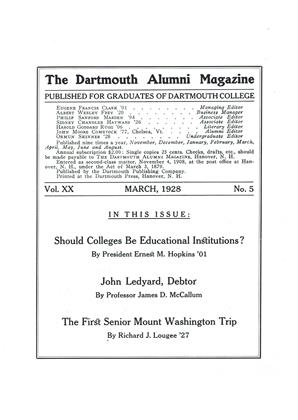There has been general comment on the article entitled "The Faith of the Fathers" by President Hopkins which appeared in the February issue of "Scribners." The New YorkTimes says of it, editorially:
A Protagonist of Youth
"At last someone has a good word to say for the intellectual competency of the American college undergraduate. President Hopkins of Dartmouth College has in the current Scribner's come to his defense, contending, 'outside opinion to the contrary,' that this youth is as fit to determine between reality and fallacy, between truth and error, and between sincerity and hypocrisy, as he will be at any later time in life. This may not be giving him a high absolute mark, but it is saying that relatively he compares favorably with his graduate brothers who have become leaders in the outside world. Some will no doubt recall the merriment which was caused by President Woodrow Wilson's asking at a Dartmouth dinner years ago, 'Who would think of graduating a college sophomore?' But even the sophomore is now, collectively at least, a less callow and more sophisticated youth than this estimate suggested. Whatever his individual shortcomings, his collective capacity is superb. It is this which President Hopkins would set to attacking original problems and even to doing research work, which the older courses put beyond his reach on the higher shelves of learning.
"One may. while holding with President Hopkins, yet hold also with President Lowell, that college youth do not always come up from the secondary schools with a sufficient mastery of the tools of thought and expression to enable them to do their work with discernment and skill and finish: but the potentiality is present even in many of those who go clumsily at their work and stumble toward the truth. The question, as Dr. Hopkins sees it. is not the one which seems to be giving most bother to the college presidents, deans and teachers, that of finding young men among the hordes of applicants who are worthy of the advantages the colleges are ready to offer, but rather that of finding colleges 'qualified to understand and competent to inspire' young men in search of such places of understanding. Ever the story of the thousands of eager youth with less formal training than the sophomores of today, who followed Abelard and endured hardship to sit under his tui- tion, comes back to one's memory to recall that it is, after all. the teacher who is to be found.
"Is the zest of youth which insists upon 'proving all things' to be trusted to hold fast to that which is good in the experience of the race and 'the faith of the fathers'? The col lege must give its undergraduates the guidance of sincere and thorough scholars and help him to become acquainted with the processes by which the world has accumulated its intellectual wealth, but it is a further prescription of one who has confidence in the student's ability to think for himself thit he should have experience in hearing the arguments of extremists and weighing them; for if there is a point of view which is attracting large groups of men to such an extent as to 'make it signicant to State or civilization,' there is no better time to become acquainted with it and to appraise it than in the undergraduate days, when the whole world of ideas is a forum or, better, a field of adventure of the spirit, and when the worship of God, to use Professor Whitehead's figure which incarnates the aspiration of the day. is 'a flight after the unattainable.' The 'faith of the fathers' can be safely entrusted to the minds of such sons."
 View Full Issue
View Full Issue
More From This Issue
-
 Article
ArticleSHOULD COLLEGES BE EDUCATIONAL INSTITUTIONS?
March 1928 By President Ernest Martin Hopkins -
 Class Notes
Class NotesClass of 1899
March 1928 By Louis P. Benezet -
 Class Notes
Class NotesClass of 1899
March 1928 By Louis P. Benezet -
 Class Notes
Class NotesClass of 1927
March 1928 By Doane Arnold -
 Lettter from the Editor
Lettter from the EditorCOMMUNICATIONS
March 1928 -
 Class Notes
Class NotesClass of 1918
March 1928 By Frederick W. Cassebeer








